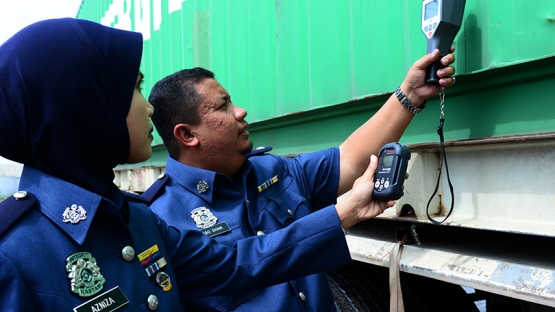A nuclear security agreement that will take effect on 8 May will reduce the risk of a terrorist attack on a nuclear power plant and make it harder to smuggle nuclear material.
The entry into force of the Amendment to the Convention on the Physical Protection of Nuclear Material (CPPNM) was secured today with the deposit of the instrument of ratification by Nicaragua, which brought the number of adherences to 102 States Parties to the CPPNM, the threshold required for the agreement to come into effect in 30 days. The Amendment, adopted more than a decade ago, will make it legally binding on countries to protect nuclear facilities. It will also extend the CPPNM’s application to nuclear material in domestic use, storage and transport.
“This is an important day for efforts to strengthen nuclear security around the world,” said IAEA Director General Yukiya Amano in a statement. The Amendment “will help reduce the risk of a terrorist attack involving nuclear material, which could have catastrophic consequences.”
The CPPNM, the only legally binding international undertaking in the area of physical protection of nuclear material, entered into force in 1987. It focuses on the physical protection of nuclear material used for peaceful purposes during international transport, but does not cover the protection of nuclear facilities or nuclear material in domestic use, storage and transport. In July 2005, the Parties to the CPPNM adopted the Amendment. The adherence of two-thirds of the States Parties to the CPPNM was required for entry into force of the Amendment. Currently, there are 152 State Parties to the Convention.
“The entry into force of the Amendment demonstrates the determination of the international community to act together to strengthen nuclear security globally,” Mr Amano said. He urged States Parties that have not yet done so to adhere to the Amendment.
What States have to do under the Amendment
The Amendment makes it legally binding for States to establish, implement and maintain an appropriate physical protection regime applicable to nuclear material and nuclear facilities under their jurisdiction. It provides for the criminalization of new and extended specified acts, and requires countries to put in place measures to protect nuclear material and nuclear facilities against sabotage.
The Amendment expands the existing offences identified in the CPPNM, including the theft and robbery of nuclear material, and establishes new ones, such as the smuggling of nuclear material and the actual or threatened sabotage of nuclear facilities. A number of the offences were also expanded to include substantial damage to the environment.
Read the full text of the Amendment here and a consolidated version of the Amendment and the CPPNM here.
International cooperation
The Amendment also provides for expanded cooperation and information sharing between States regarding rapid measures to locate and recover stolen or smuggled nuclear material, to mitigate any radiological consequences of sabotage and to prevent and combat related offences. It also establishes channels for cooperation and consultation, directly among States via established points of contact or through the IAEA, to obtain guidance on the design, maintenance and improvement of national systems of physical protection.
“It is now important that practical and operational arrangements and improved information exchange mechanisms be established to enable us to be better placed to face emerging nuclear security challenges,” said Peri Lynne Johnson, IAEA Legal Adviser and Director of the Office of Legal Affairs.
The IAEA held the first ever Technical Meeting of the Points of Contact and Central Authorities of States Parties to the CPPNM in December 2015. Mr Amano announced last week that the IAEA will host annual meetings of national points of contacts as well as periodic conferences to review the implementation of the convention.
“I will bring the Parties together to work out ways of improving the mechanisms for sharing such information, while protecting confidentiality,” Mr Amano said.
The Director General, as depositary for the Convention, will convene a conference of States Parties five years after the Amendment’s entry into force to review the implementation of the amended Convention as well as its adequacy.
IAEA support
Although States Parties will be responsible for implementing the Amendment, the IAEA will facilitate implementation by providing legislative and technical assistance to Member States. This includes assistance in the drafting of national implementing legislation and in establishing, implementing, and maintaining a State’s physical protection regime. In addition, the IAEA continues to stand ready to help, upon request, those countries which are not parties to either the Convention or the Amendment.
“The IAEA stands ready to further strengthen its cooperation with the States Parties on their national physical protection regime applicable to nuclear material and nuclear facilities under their jurisdiction in accordance the IAEA Nuclear Security Series,” said Khammar Mrabit, Director of the IAEA Division of Nuclear Security.
Adherence to the Amendment by more than 100 countries demonstrates the strong international will to act together to strengthen nuclear security globally.




